- Home
- Paul Jennings
A Different Boy
A Different Boy Read online
Also by Paul Jennings
A Different Dog
The Unforgettable What’s His Name
illustrated by Craig Smith
Don’t Look Now series,
illustrated by Andrew Weldon
Unreal! The Ultimate Collection
The Nest
The Cabbage Patch Fibs
illustrated by Craig Smith
Paul Jennings’ Spookiest Stories
and many more!
First published by Allen & Unwin in 2018
Copyright © Text, Lockley Lodge Pty Ltd 2018
Copyright © Illustrations, Geoff Kelly 2018
All rights reserved. No part of this book may be reproduced or transmitted in any form or by any means, electronic or mechanical, including photocopying, recording or by any information storage and retrieval system, without prior permission in writing from the publisher. The Australian Copyright Act 1968 (the Act) allows a maximum of one chapter or ten per cent of this book, whichever is the greater, to be photocopied by any educational institution for its educational purposes provided that the educational institution (or body that administers it) has given a remuneration notice to the Copyright Agency (Australia) under the Act.
Allen & Unwin
83 Alexander Street
Crows Nest NSW 2065
Australia
Phone: (61 2) 8425 0100
Email: [email protected]
Web: www.allenandunwin.com
ISBN 978 1 76052 350 3
eISBN 978 1 76063 704 0
For teaching resources, explore www.allenandunwin.com/resources/for-teachers
Cover and text design by Sandra Nobes
Cover illustration by Geoff Kelly
Set by Sandra Nobes
Contents
One
Two
Three
Four
Five
Six
Seven
Eight
Nine
Ten
One
The boy arrived at Wolfdog Hall just after breakfast. He was hungry and could sense that he was going to stay that way until lunchtime.
In the distance, he could see the funnel of an ocean liner fighting for room among the chimney tops. It was the last ship leaving for the New Land. He should have been on it. And he would have been on it. But there was no room for an unaccompanied boy.
He was met by a bearded officer wearing a leather jacket with a large silver badge pinned on one side. He led the boy up the steps and through a gloomy entrance. The dark corridor inside was lined with thick wooden doors, each bearing the name and picture of a plant. Oak, Palm, Beech, Ivy and many more. The officer read them out in a loud voice.
‘Here we are,’ he said. ‘Cactus.’ He seemed to find that amusing. He took the boy inside and pointed at one of the six identical beds. Anton threw his pack on the bed and the officer immediately picked it up and started rummaging through it.
‘Just checking for smokes,’ he said. ‘There are kids in here who would sell their grandmother for one. And other things.’ He seemed disappointed that there were none to be found.
He pulled a small stack of labels out of his pocket and riffled through them.
‘Here,’ he said. ‘O Muller. Pin it on. Just in case you forget who you are.’
He handed Anton the label.
‘What’s the O for?’ said the boy.
‘You get either O or C,’ said the officer. ‘O is for orphan.’
‘What’s C for?’
‘Criminal.’
Anton’s eyes widened and the man, seeing his expression, softened his tone just a little.
‘Custody,’ he said. ‘The Cs have all been before the tribunal for robbery or assault or … worse.’
‘Worse?’ said Anton.
The man scratched his beard. ‘Don’t worry,’ he said. ‘You’ll be okay because you are an O. And the Os have privileges. They get to go out with relatives on weekends. If they have any.’
‘I don’t have any,’ said Anton.
He could feel tears starting to well behind his eyes. He tried to blink them away.
‘Well,’ said the man, ‘most likely you’ll end up a C then.’
The boy looked puzzled.
The man sighed.
‘It’s like this. Let’s say that a boy who is a C absconds – runs away – and he takes an O with him. The two runaways don’t have anything to eat, so they steal. Then they’re caught and brought before the tribunal and the O becomes a C.’
‘That’s not fair,’ said Anton.
‘Life isn’t fair,’ said the officer. He tapped his silver badge. ‘Do you think I like this job?’
Anton felt a wave of despair wash through his body. He knew instinctively that he couldn’t let it show.
‘You and me could abscond together,’ he said.
The man stopped and glared. Then, realising that it was a joke, he laughed roughly.
‘I’ll give you a tip,’ he said. ‘If you’re thinking of absconding, don’t swim in the pool. There’s so much chlorine in the water that anyone who spends any time in it will end up with faded yellow hair. It’s the first thing the cops look for when an inmate absconds.’
Anton followed him back down the corridor and out onto a winding pavement. Two rows of boys were lined up. They were dressed in a motley mixture of grubby clothes. Jumpers, windcheaters and old jackets, most of which had grease marks from long-forgotten meals.
Each boy had a name label pinned on his chest. About half of them had faded hair.
Anton could already see scornful looks being thrown his way. A shiver ran down his spine. He was a new boy. It showed because he wore neat grey trousers and had fear written on his face.
The officer pointed to a space at the rear next to a thin boy who was shifting nervously from foot to foot.
‘Stand next to Smit,’ said the officer.
Smit gave Anton a tentative smile. Anton smiled back.
‘Forward,’ shouted the officer. ‘No dawdling.’
The ragged group shuffled forward. A boy just in front of Smit opened a crumpled paper bag and took out half a biscuit. He shoved it in his mouth and threw the bag onto the ground.
‘Pick up that rubbish, Brosnik,’ yelled the officer.
A cold, sad memory suddenly swept through Anton as he remembered. His mother’s voice. Saying that word.
‘It’s not rubbish,’ she had said.
If only he could hear her say it again. Once the memory of that word had been painful but now that she was in a cold, cold grave he would give anything to hear her speak. He tried not to remember, but he couldn’t help it.
He was only five at the time. He loved the way his mother read him stories. And he admired the way she could write letters and notes. So he had a try at writing himself. The old woman next door had come in to look after him.
He had grabbed the piece of paper and showed it to her. ‘What does this say, Old Lady?’ he said excitedly.
She glanced at his scribble and snorted just one word.
‘Rubbish.’
He was so pleased. That night, when visitors came, he had showed them the paper and proudly told them that he could now read and write.
‘It says “rubbish”,’ he said. ‘Old Lady says so.’
They had all laughed loudly and he had run off to his bed crying. His mother followed.
‘Don’t cry, dear,’ she said. ‘It’s not rubbish.’
That just made it worse, because he really thought he had written the word rubbish. He sobbed even louder. So, she took him on her knee and told him that he was sweet and that she loved him.
And of course he loved her – she was a wonderful mother. But the word rubbish always hu
rt. Now even more than ever.
Brosnik retrieved the offending paper bag and the line moved on. The thin boy next to Anton had the soles of one shoe flapping open like a slack jaw. He walked with difficulty, lifting his right knee high to prevent himself tripping. He suddenly stumbled and lurched into the boy in front who turned and barked his annoyance.
‘Watch it, Skinny,’ he growled. ‘Or we’ll fix your other boot too.’
‘Sorry, Brosnik,’ said Smit. He looked at Anton, trying to hide his shame.
For some reason Anton always made friends with boys who were shy or nervous or knew less than he did. He liked helping them. But he didn’t know why.
‘He’s just a bully,’ said Anton under his breath. ‘Don’t worry about it.’
He had spoken too loudly. Brosnik turned and spat straight into Anton’s face. Then he shuffled on as if nothing had happened. Anton felt an urge to shove Brosnik in the back. But he thought better of it.
The procession wound its way through dozens of empty huts and reclaimed barracks. Occasionally they passed other men, all wearing the same uniform but not the silver badge. They nodded at the officer and he sometimes nodded back.
The school itself consisted of four box-shaped rooms arranged around a bitumen quadrangle.
Four young men stood in a row behind a short, older man who stood erect like a sergeant major on a parade ground. They were all dressed in suits, but only the older man’s jacket looked pressed and neat.
The double row of boys stopped and turned to face him.
The officer pointed at the five men.
‘Your teachers. The holidays are over,’ he said. He was obviously pleased at the prospect. ‘That’s Mr Martens, the headmaster, and his staff. Do what they say.’
He started to walk away. Anton looked hopefully at the four teachers. Surely there was kindness somewhere in this place. Three of the teachers were hard to read but the fourth one smoked a cigarette and wore a casual, amused grin.
Mr Martens was a solid man. Now that the officer had gone he let his eyes pass slowly over every boy. He took his time. Finally he spoke.
‘Okay,’ he said. ‘Now it’s time for some hard work.’
A groan went up from the group.
‘Yes, I know, I know. No more swimming pool and table tennis. No more lounging around.’
There were a few more groans.
‘For those of you who are new, there are no locks on the gates here. If you want to abscond there is nothing to stop you. Plenty have. But they are always caught. Always.’
He let his eyes run across the group. He had a piercing, penetrating stare. He was in no hurry to speak. His silence said it all. Finally, he continued.
‘For the benefit of the new boys, I will introduce my teachers. Boys aged seven and eight will be in Mr Hartog’s class. He is also our music teacher.’
Mr Hartog shook his curly hair and gave a weak smile.
‘Boys aged nine and ten will be in Mr John’s class.’
Mr John nodded his head.
‘Boys aged eleven and twelve will have Mr Hope for their teacher. You had better hope that you don’t give him any trouble. Or you will answer to me.’
Mr Hope did not seem to appreciate the joke but he held up his hand in greeting.
Anton studied the faces of the teachers introduced so far. He realised that he had something in common with them. They were nervous. Perhaps this was also their first day. This was a tough place. Even for a teacher.
The headmaster cleared his throat and nodded as if he knew secret information.
‘The older boys will be with Mr Steel. I know there will not be any trouble there.’
Mr Steel seemed not to hear. He threw down his cigarette and stamped on it. Then he gave a humourless grin and said, ‘Otherwise known as The Claw.’
The older boys tittered nervously.
Anton guessed which teacher was to be his. He instinctively knew that all he would learn in that classroom was how to survive injustice and cruelty.
Mr Martens took a whistle from his pocket. ‘When I blow this,’ he said, ‘you will follow your teacher. In silence.’ He put the whistle to his lips and the boys sorted themselves into lines in front of their allocated teacher.
Mr Steel turned and nodded at an open door. There was a scuffle as his boys jostled through the door and raced for the back desks. Anton found himself looking at the last empty place, which was right at the front.
Mr Steel stood silently until they settled down. He waited a few more beats, then picked up a claw hammer and a large nail from his desk. He walked slowly across the room and began to bang the nail into the side of a cupboard. When he had finished, he opened the drawer of his desk, pulled out a long, black strap and hung it on the nail.
A soft intake of breath, mainly from the Os, swept across the room.
Mr Steel picked up a form from his desk and scanned it.
‘Where’s Muller?’ he said.
Anton tentatively put up his hand.
‘It says here that you’re smart,’ he said. ‘You know plenty. But … you can’t—’
‘Swim,’ Anton blurted out.
Mr Steel scowled at the interruption. Anton desperately tried to save himself.
‘My mother drowned two months—’
‘Yes, yes, yes,’ growled Mr Steel. ‘We all have our problems here. Some have dead mothers, some can’t swim, some can’t read, and some can’t even wipe their own bum. So, I’m going to start you all off with something easy. In front of you is your workbook. You are going to look after it. You are going to be proud of it. You will never, ever lose it, abuse it or do anything but your best work in it.’
He glanced over at the strap hanging on the cupboard.
‘You all have coloured pencils. You will spend the next half-hour decorating the front page. Make sure that it’s neat. And clean. And you know what I mean by clean.’
Some of the boys sniggered.
‘Yes,’ he went on. ‘No filth. No jokes. If I don’t like your work you will do it again. At lunchtime.’
There were bemused looks and groans but Anton relaxed a little. He was good at art. And he knew a lot about it. He liked the work of Dali, which was weird, and also of the Impressionists, which was peaceful. He decided that an Impressionist style would be safe.
‘Start,’ said Mr Steel. He reached into his desk and pulled out a newspaper and turned to the back page. He began to circle various items with a pen.
Each boy picked up a pencil. Some had their noses almost touching the paper. Some gnawed the ends of their pencils. Others chewed their fingernails. Some did nothing. Anton set to work. He began to draw a scene from the New Land. The place of his dreams. The place of his dead parents’ dreams. A warm, sunburnt country – a land of sweeping plains and rugged mountains which ran down to golden beaches surrounded by a jewel sea.
The hint of a smile came to him as he worked. One day he would get there.
The boys scratched and scribbled in silence. Mr Steel sat at his desk staring at a book, not looking up even once. Finally, he growled, ‘Stop work. Write your name on the cover of your book.’ The boys began to scribble. Another thought occurred to him.
‘For those of you who can’t spell your own name, you can copy it from your label.’
At that very moment Anton felt a sharp pain in his arm. He gasped and turned around. It was Brosnik, who was sitting behind him. He had shoved the point of a pencil deep into Anton’s soft skin. Anton pulled his arm away, knowing that he could not cry out.
Brosnik leaned over, grabbed Anton’s book and plonked his own in its place.
Anton examined Brosnik’s drawing. It was an unmistakable image of Mr Steel, with his pants down, bending over a chair. A smouldering cigarette was sticking out of his backside. Anton knew without even looking that his own name had been written on the cover of Brosnik’s book.
Mr Steel looked at the class.
‘Take up the books … Muller,’ he said.
>
Anton stood and stared around the classroom. The awful truth dawned on him. The faces of all the boys showed fear, loneliness or anger. The teachers he had seen outside were mean or weak. There was no hope here. It was a place of despair.
If he handed in the rude drawing he would get the strap. And if he named Brosnik as the guilty party he would be in for a beating from the bullies. The other kids would be too frightened to support him even if they wanted to.
The words of his dead father came back to him. The words he had spoken when he surveyed the ruins of their bombed-out street.
‘If you’ve got a bad deal,’ his father had said, ‘get out of it and move on.’
Anton slowly put Brosnik’s book down on the desk and walked to the door.
‘Where do you think you’re going?’ growled Mr Steel.
Anton opened the door.
‘I’m getting out of it,’ he said, ‘and moving on.’
The other boys were staring at Anton with wide eyes. Some in disbelief, some in horror. Brosnik was grinning like a spectator at an execution.
Anton could hardly believe what he was doing himself. His strength was only just greater than his fear. But he took the final step and opened the door.
To his surprise, Mr Steel did not come after him. He did not yell. He merely walked over to the empty desk, picked up the book containing the drawing and glanced at the first page.
‘You’ll be back,’ he said. ‘And when you are you will be sorry.’
Anton shivered, stepped out of the classroom and walked into the deserted quadrangle. He hurried away between two of the portable classrooms. He tried to walk slowly, even though every muscle seemed to be willing him into a run.
He followed a footpath past a swimming pool. The smell of chlorine filled the air. A piece of wood dangled on the wire gate. It was a crude sign, with a red line slashed across the outline of a boy peeing into the pool.
He shuddered. He couldn’t swim, but even if he could there was no chance he would have entered that pool. Ever.
He reached the boundary fence and passed out through a wire gate. A bitterly cold wind was blowing. His thick black hair whipped his eyes and made them water. But he hardly noticed it.
He was free.

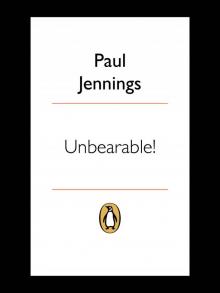 Unbearable!
Unbearable!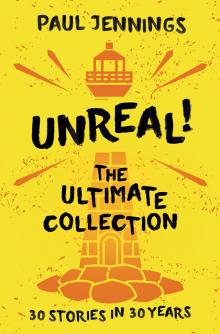 Unreal Collection!
Unreal Collection!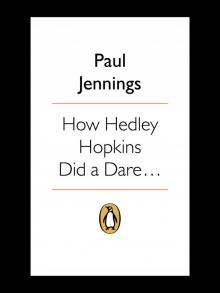 How Hedley Hopkins Did a Dare...
How Hedley Hopkins Did a Dare...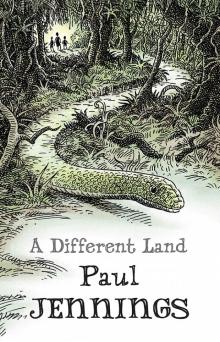 A Different Land
A Different Land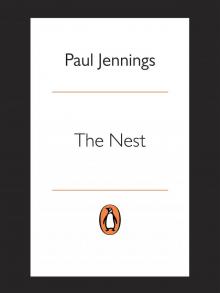 The Nest
The Nest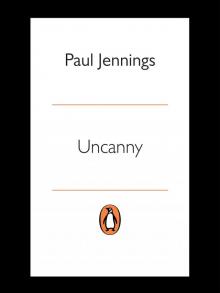 Uncanny!
Uncanny!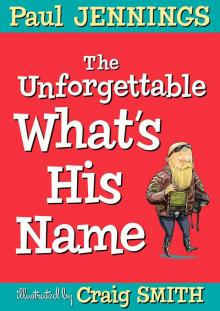 The Unforgettable What's His Name
The Unforgettable What's His Name Paul Jenning's Weirdest Stories
Paul Jenning's Weirdest Stories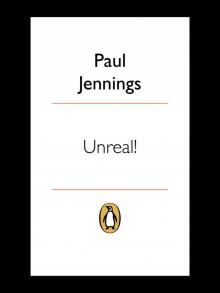 Unreal!
Unreal! Paul Jenning's Spookiest Stories
Paul Jenning's Spookiest Stories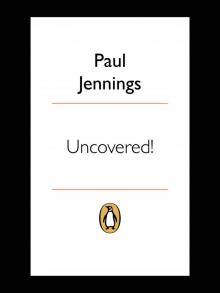 Uncovered!
Uncovered! Paul Jennings' Trickiest Stories
Paul Jennings' Trickiest Stories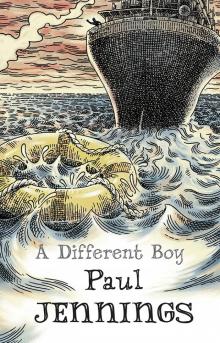 A Different Boy
A Different Boy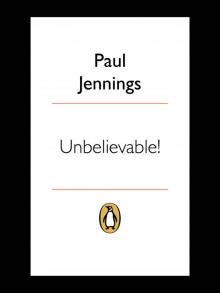 Unbelievable!
Unbelievable!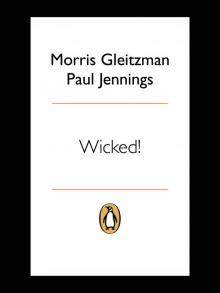 Wicked Bindup
Wicked Bindup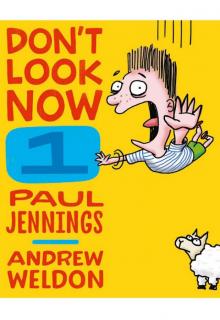 Don't Look Now 1
Don't Look Now 1